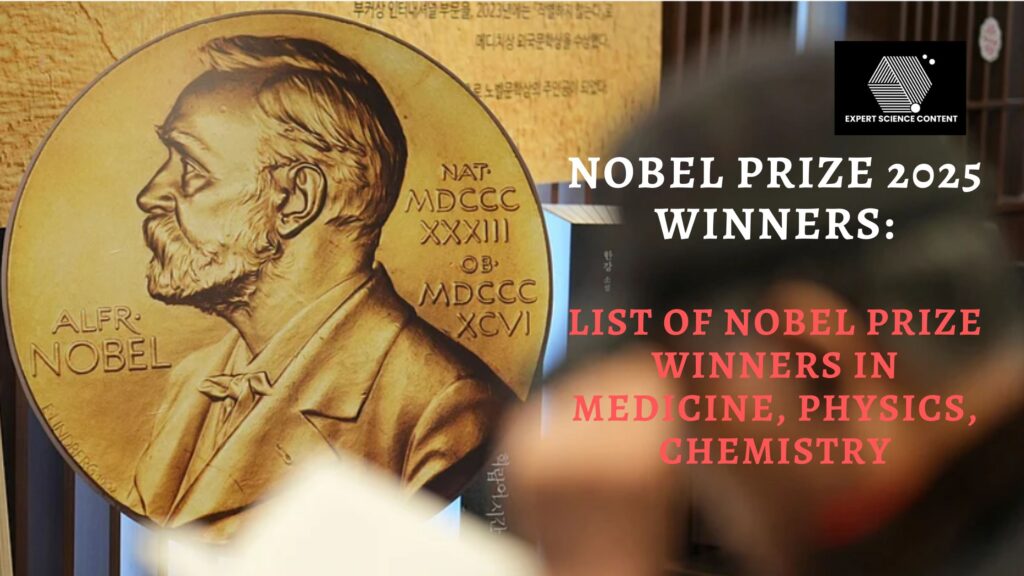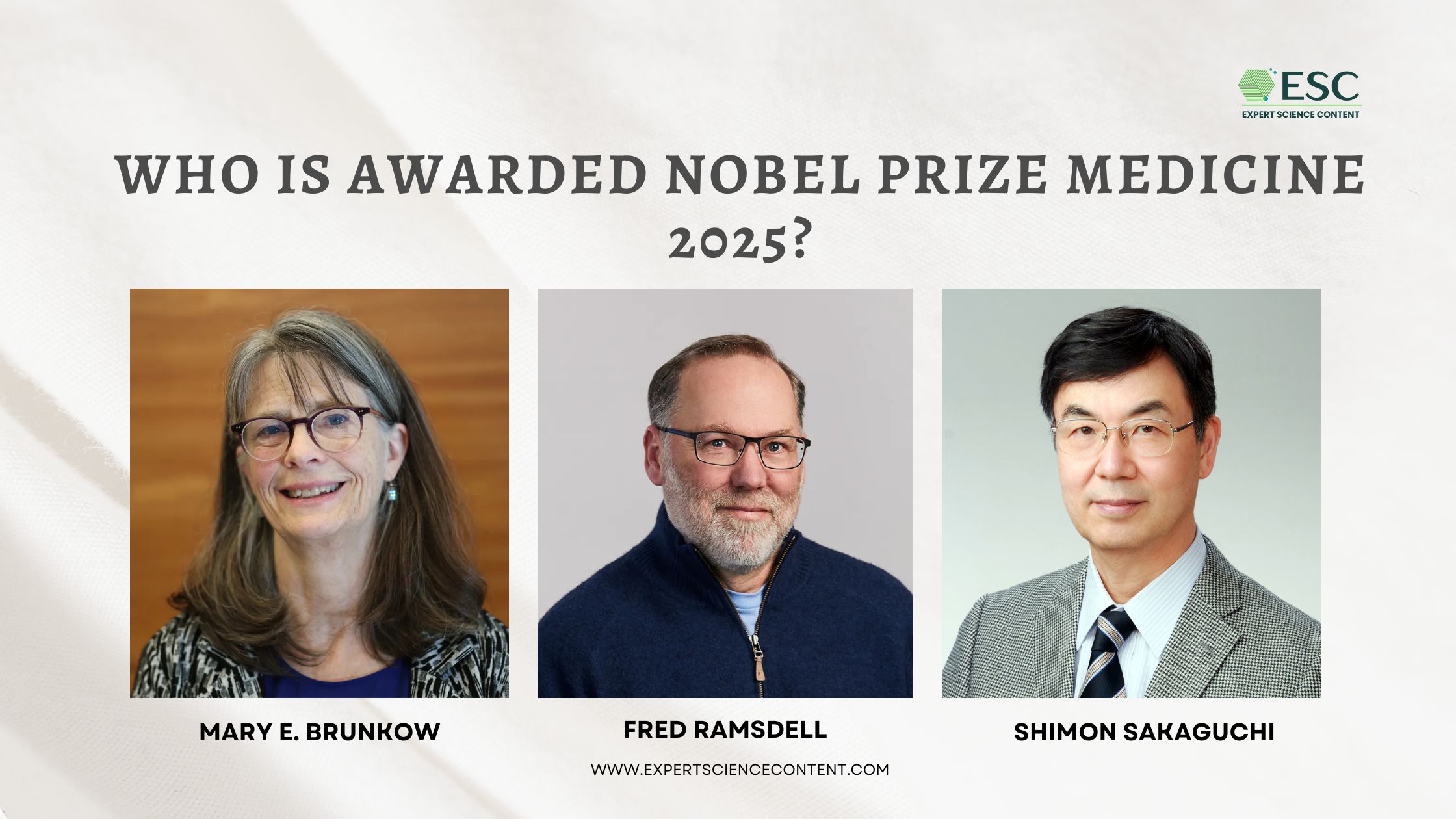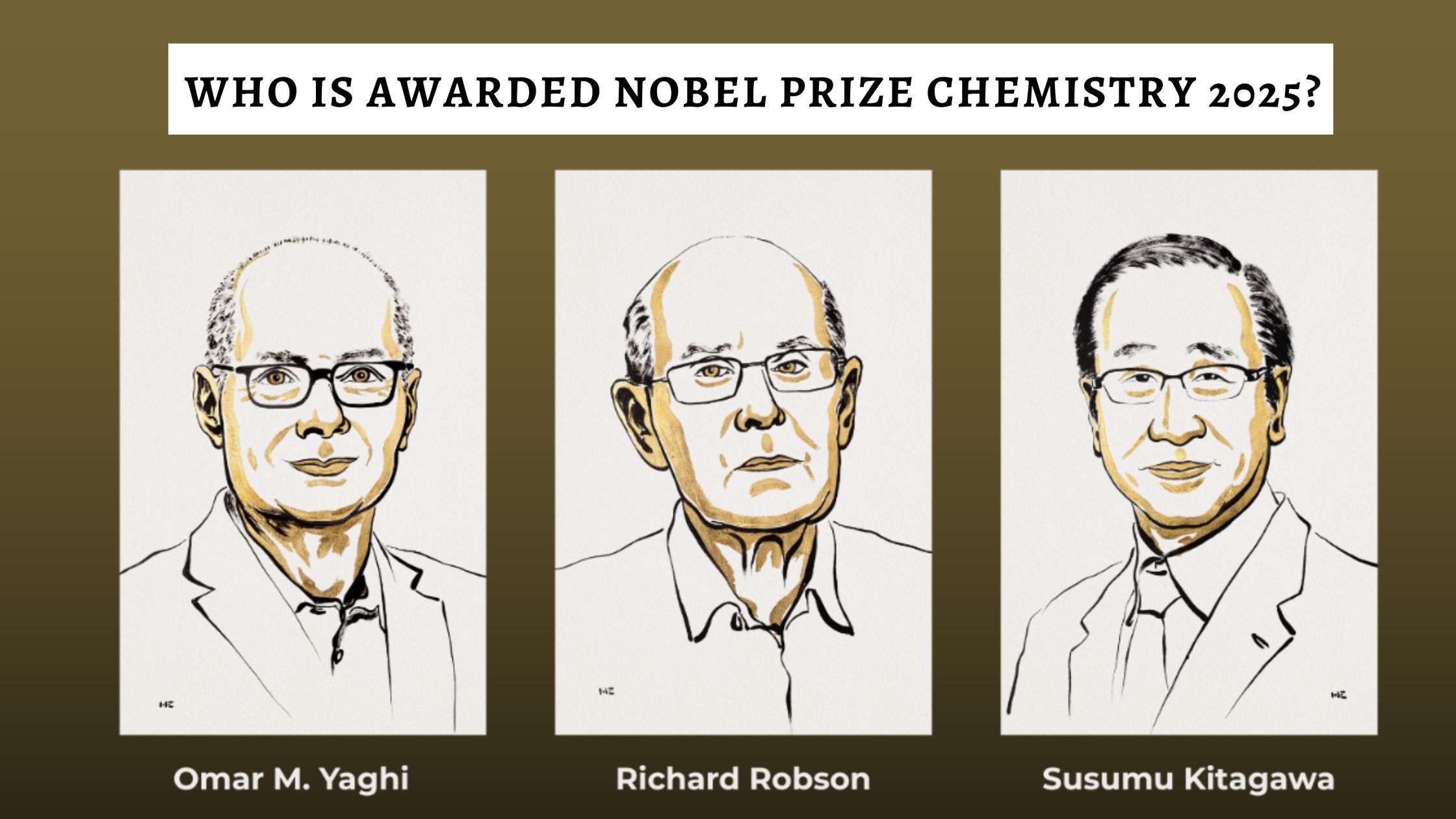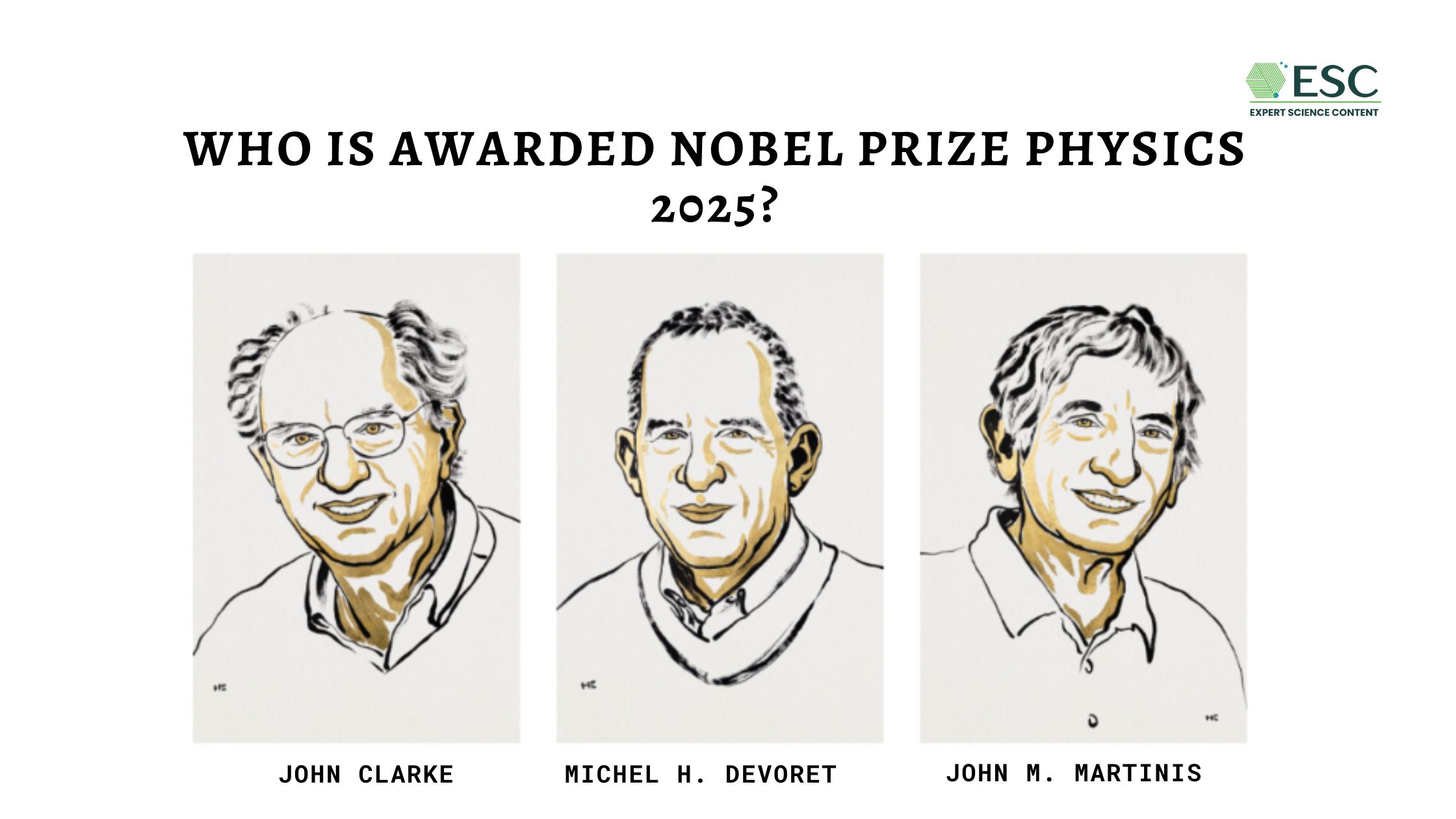Nobel Prize 2025 Winners: List of Nobel Prize Winners in Medicine, Physics, Chemistry
- Published By: Dr. Anindita Talukdar
- Published On: October 11, 2025
- 5 Minutes to read

The recent list of Nobel Prize winners for 2025 was announced on October 6th by the Nobel Assembly at the Karolinska Institutet. Mary E. Brunkow, Fred Ramsdell, and Shimon Sakaguchi were awarded the Nobel Prize in Physiology or Medicine.
The Nobel Prizes are awarded by the Nobel Foundation, a private institution established in 1901 according to Swedish inventor Alfred Nobel’s will. It recognizes discoveries that are true to the principle of “for the greatest benefit to humankind”. The Nobel prizes are awarded annually in six different categories: physics, chemistry, medicine, literature, peace, and economic sciences. Each nobel laureate receives a gold medal, a diploma, and a cash award of 11 million Swedish kronor ($11,56,652), funded by the Nobel Foundation.
Who is Awarded Nobel Prize Medicine 2025?
 The Nobel Prize in Medicine or Physiology is one of the most prestigious international awards in medical science awarded by The Nobel Assembly at Karolinska Institutet in 2025. It is awarded annually by the Nobel Assembly at Karolinska Institutet, Sweden, to honor the contributions that advance health science and life sciences for benefiting humankind by new discoveries in physiology or medicine, and biomedical research. Officially known as the Nobel Prize in Physiology or Medicine, the honour has been awarded 115 times to 229 Nobel Prize laureates between 1901 and 2024.
The Nobel Prize in Medicine or Physiology is one of the most prestigious international awards in medical science awarded by The Nobel Assembly at Karolinska Institutet in 2025. It is awarded annually by the Nobel Assembly at Karolinska Institutet, Sweden, to honor the contributions that advance health science and life sciences for benefiting humankind by new discoveries in physiology or medicine, and biomedical research. Officially known as the Nobel Prize in Physiology or Medicine, the honour has been awarded 115 times to 229 Nobel Prize laureates between 1901 and 2024.
2025 Nobel Prize in Physiology or Medicine was awarded to:
- Mary E. Brunkow: She was born in 1961 and holds a Ph.D. from Princeton University, Princeton, USA. She is currently a Senior Program Manager at the Institute for Systems Biology in Seattle, USA
- Fred Ramsdell: He was born in 1960 and holds a Ph.D. from the University of California, Los Angeles, USA. He is currently a Scientific Advisor at Sonoma Biotherapeutics, San Francisco, USA.
- Shimon Sakaguchi: He was born in 1951 and holds a M.D. and a Ph.D. degree from Kyoto University, Japan. He is currently a distinguished Professor at the Immunology Frontier Research Center, Osaka University, Japan.
Why They Won the Nobel Prize in Medicine?
Nobel prize in medicine is awarded to the above-mentioned laureates for their groundbreaking discoveries concerning peripheral immune tolerance that prevents the immune system from harming the body.
As the human body has security guards for their immune systems, which are called regulatory T cells, they prevent immune cells from attacking our own body.
Shimon Sakaguchi discovered a new class of immune cells which were unknown to scientists. This class of immune cells protect the body from autoimmune diseases. Dr. Mary E. Brunkow and Fred Ramsdell, discovered Foxp3, a mutation in a gene that causes a rare, life-threatening genetic disorder affecting the human immune system (IPEX Syndrome).
Shimon Sakaguchi linked both of these two discoveries and proved that the Foxp3 gene governs the development of the new class of immune cells he identified in 1995, currently called as regulatory T cells. They monitor other immune cells and ensure that the human immune system tolerates their own tissues.
Who is Awarded Nobel Prize Chemistry 2025?
 The Nobel Prize in Chemistry is awarded every year by the Royal Swedish Academy of Sciences to scientists in the various fields of chemistry for their outstanding contributions and to honor the laureates who have benefited humankind. The Nobel prize in chemistry is one of the five Nobel Prizes established by Alfred Nobel. An Australian, a Japanese and a Jordanian-American scientist were announced winners of the Nobel Prize in Chemistry for the development of metal–organic frameworks.
The Nobel Prize in Chemistry is awarded every year by the Royal Swedish Academy of Sciences to scientists in the various fields of chemistry for their outstanding contributions and to honor the laureates who have benefited humankind. The Nobel prize in chemistry is one of the five Nobel Prizes established by Alfred Nobel. An Australian, a Japanese and a Jordanian-American scientist were announced winners of the Nobel Prize in Chemistry for the development of metal–organic frameworks.
Nobel Prize Chemistry 2025 was awarded to:
- Susumu Kitagawa: He was born in 1951 in Kyoto, Japan. She did her PhD from Kyoto University, Japan. He is currently a professor at Kyoto University, Japan.
- Richard Robson: He was born in 1937 in Glusburn, UK and holds a PhD from University of Oxford, UK. He is currently a professor at University of Melbourne, Australia.
- Omar M. Yaghi: He was born in 1965 in Amman, Jordan and holds a PhD from University of Illinois Urbana-Champaign, USA. Currently he is a professor at University of California, Berkeley, USA.
Why They Won the Nobel Prize Chemistry in 2025?
Susumu Kitagawa, Richard Robson and Omar Yaghi are awarded the Nobel Prize in Chemistry 2025, for discovering a new class of materials, called metal-organic frameworks (MOF).
These new materials or molecular architecture can be used to harvest water from desert air, capture carbon dioxide, conduct electricity and store toxic gases or catalyse chemical reactions.
These MOFs are composed of two main components, an inorganic metal cluster and an organic molecule called a linker, so they are often referred to as hybrid organic-inorganic materials. Over the last three decades, these materials have been greatly refined and utilized in a wide range of applications. Metal-organic frameworks can be used for trapping CO2, extracting water from desert air & separating rare-earth materials from waste, among other things. It has been speculated that the integration of AI tools into MOF research could lead to the discovery of certain applications, which could solve modern energy and environmental challenges in future.
Who is Awarded Nobel Prize Physics 2025?
 The Nobel Prize in Physics is awarded by the Royal Swedish Academy of Sciences to those who have made the most outstanding contributions to mankind in the field of physics to honor the laureates for benefiting humankind.
The Nobel Prize in Physics is awarded by the Royal Swedish Academy of Sciences to those who have made the most outstanding contributions to mankind in the field of physics to honor the laureates for benefiting humankind.
The Nobel Prize in Physics is awarded every year and this is awarded jointly to the following laureates for the discovery of macroscopic quantum mechanical tunnelling and energy quantisation in an electric circuit:
- John Clarke: He was born in 1942, is a British physicist and currently a professor at the University of California, Berkeley.
- Michel H. Devoret: He is a French-American physicist, born in 1953 in Paris, France. He is currently a professor of Physics at University of California, Santa Barbara, CA, USA.
- John M. Martinis: He was born in 1958 and currently an American physicist and Professor of Physics at the University of California, Santa Barbara, USA.
Why They Won the Nobel Prize Physics?
John Clarke, Michel H. Devoret and John M. Martinis was awarded the Nobel Prize in physics 2025, for discovering macroscopic quantum mechanical tunnelling and energy quantisation in an electric circuit. Macroscopic quantum phenomena are processes showing quantum behavior at the macroscopic scale, rather than at the atomic scale where quantum effects are prevalent. As of 2025, seven Nobel Prizes in Physics have been awarded for work related to macroscopic quantum phenomena.
Olle Eriksson, Chair of the Nobel Committee for Physics says “It is wonderful to be able to celebrate the way that century-old quantum mechanics continually offers new surprises. It is also enormously useful, as quantum mechanics is the foundation of all digital technology,”
2024 Nobel Prize Winners
In 2024, nobel prize medicine awarded to Victor Ambros and Gary Ruvkun for discovering microRNAs; nobel prize physics awarded to John J Hopfield and Geoffrey E Hinton for joint foundational work on artificial intelligence; and nobel prize chemistry awarded to David Baker, Demis Hassabis, and John M Jumper for their work in protein structure prediction breakthrough.
Insights from Great Minds: What the Nobel Prize Teaches Us
The Nobel Prize 2025 winners in Medicine, Physics, and Chemistry have once again shown how deep curiosity, relentless dedication, and collaboration can lead to discoveries that change the world. Dr. Mary E. Brunkow, Fred Ramsdell, and Shimon Sakaguchi were awarded the Nobel Prize in Physiology or Medicine for uncovering the mechanisms behind immune regulation — research that opens new frontiers in treating autoimmune diseases. Their work stands as a powerful reminder that true scientific progress — and human advancement — comes not from self-promotion, but from collaboration, generosity, and a shared commitment to the greater good.
If we look closely at the craft of Dr. Mary E. Brunkow, her dedication and truthfulness reminds us that true science thrives on patience, integrity, and purpose. In an era where citations and h-index often dominate our goals, Brunkow’s journey is a powerful reminder that real impact comes from staying true to curiosity, and the quiet pursuit of truth.Final Thoughts
Since 1901, the Nobel Prizes have been awarded 621 times to over 1,000 individuals and organizations. Each laureate receives a gold medal featuring an image of Alfred Nobel.
For students and researchers, their journeys serve as a powerful reminder: groundbreaking work often starts with asking bold questions and persisting through challenges. If we think closely, research is not just about being present in the lab and completing our task— it’s about thinking critically, collaborating globally, and staying inspired to the greater cause.
So never stop learning, and never underestimate the power of curiosity and hard work. Whether you’re just beginning in science or deep into your research career, there’s always more to explore.

Dr. Anindita Talukdar
The creative behind ESC sharing smart actionable tips and insights to level up writing and research skill.
Join ESC
Get our newsletter

Dr. Anindita Talukdar
The creative behind ESC sharing smart actionable tips and insights to level up writing and research skill.

Fantastic visual appeal on this web site, I’d value it 10 on 10. The blogs were awesome.
Thank you so much for your kind words.
I genuinely treasure your piece of work, Great post.
Thank you so much! It means a lot
I am lucky that I noticed this web blog, exactly the right info that I was looking for! .
Glad you liked the blog! Keep reading — we will be coming up with a few unique posts about science and healthcare.
Thanks for sharing. I read many of your blog posts, cool, your blog is very good.